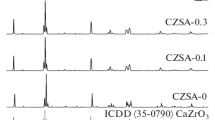Abstract
Single phase sodiumβ-alumina solid electrolyte was found to undergo isothermal phase separation in electrochemical cells, where a large oxygen potential gradient was imposed across the electrolyte and electrodes, not reversible to sodium ions, were short circuited. The experimental conditions and evidence of decomposition are outlined and a thermodynamic explanation for the phenomenon is given. This finding may lead to new methods for making multi-layered ceramic materials involving ionic conductors.
Similar content being viewed by others
References
K. T. Jacob and O. M. Sreedharan, unpublished research.
D. R. Stull and H. Prophet et al., JANAF Thermochemical Tables, NSRDS-NBS 37, US Department of Commerce, Washington, DC, USA.
Author information
Authors and Affiliations
Rights and permissions
About this article
Cite this article
Jacob, K.T. Decomposition of β-alumina in an oxygen potential gradient. J Appl Electrochem 13, 469–472 (1983). https://doi.org/10.1007/BF00617521
Received:
Issue Date:
DOI: https://doi.org/10.1007/BF00617521




